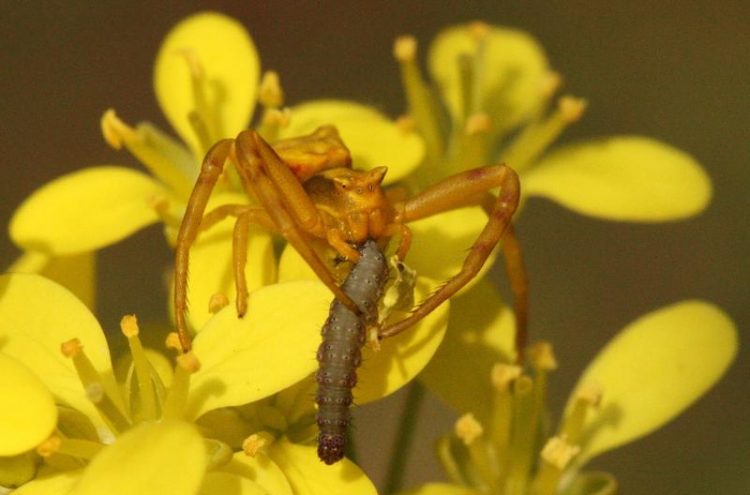Crab spiders: When Enemies Come to Help

By eating larvae, crab spiders help the flowering plants. Anina C. Knauer
Interactions between organisms such as plants and animals can be found everywhere in nature. Anina Knauer and Florian Schiestl, a professor at UZH’s Department of Systematic and Evolutionary Botany, has taken a closer look at one such instance: the interaction between crab spiders and the buckler-mustard, a yellow flowering plant common in Europe.
The harmful side of crab spiders
Crab spiders are predators that lie in wait for their prey on the flowers. It used to be assumed that these spiders harm the plant, because they catch pollinating insects or discourage them from visiting the flowers. The ecologists at UZH have now been able to reveal a surprising phenomenon: “Crab spiders find the plant by following the scent of its flowers. They do so using β-ocimene, the floral volatile that also attracts bees,” says Schiestl.
Floral volatile serves as a cry for help
Indeed if crab spiders are sitting on the flowers, fewer bees will visit because they’re discouraged by the spiders. But the spiders don’t just eat pollinators. They also eliminate plant-eating insects and their larvae that feed on the flowers or fruit and damage the plant. This way the crab spiders benefit the plant, bearing out the principle that the enemy of my enemy is my friend.
Apparently the benefit is so great that when attacked by florivores, the plants give off larger amounts of the floral volatile that attracts the spiders. This “cry for help” actually works: in response to it the spiders are increasingly likely to visit the flowers that are being attacked, where they find rich pickings.
Understanding interactions to protect ecosystems
The study shows that the effect of interacting organisms is highly dependent on the ecological context. But in complex ecosystems the consequences can’t always be predicted. This means that the disappearance of existing interacting partners or the appearance of new ones can have unforeseeable implications for individual members of an ecosystem. “For this reason it’s important to better understand the interactions between organisms and their consequences to be able to apply the insights in the protection of ecosystems or organic farming,” concludes Florian Schiestl.
Literature:
Anina C. Knauer, Moe Bakhtiari and Florian P. Schiestl. Crab spiders impact floral-signal evolution indirectly through removal of florivores. Nature Communications. April 10,2018. DOI: 10.1038/s41467-018-03792-x
Contact:
Prof. Florian Schiestl, PhD
Department of Systematic and Evolutionary Botany
University of Zurich
Phone: +41 44 634 84 09
E-mail: florian.schiestl@systbot.uzh.ch
http://www.media.uzh.ch/en/Press-Releases/2018/crab-spiders-help-flowering-plant…
Media Contact
All latest news from the category: Life Sciences and Chemistry
Articles and reports from the Life Sciences and chemistry area deal with applied and basic research into modern biology, chemistry and human medicine.
Valuable information can be found on a range of life sciences fields including bacteriology, biochemistry, bionics, bioinformatics, biophysics, biotechnology, genetics, geobotany, human biology, marine biology, microbiology, molecular biology, cellular biology, zoology, bioinorganic chemistry, microchemistry and environmental chemistry.
Newest articles

Innovative 3D printed scaffolds offer new hope for bone healing
Researchers at the Institute for Bioengineering of Catalonia have developed novel 3D printed PLA-CaP scaffolds that promote blood vessel formation, ensuring better healing and regeneration of bone tissue. Bone is…

The surprising role of gut infection in Alzheimer’s disease
ASU- and Banner Alzheimer’s Institute-led study implicates link between a common virus and the disease, which travels from the gut to the brain and may be a target for antiviral…

Molecular gardening: New enzymes discovered for protein modification pruning
How deubiquitinases USP53 and USP54 cleave long polyubiquitin chains and how the former is linked to liver disease in children. Deubiquitinases (DUBs) are enzymes used by cells to trim protein…



